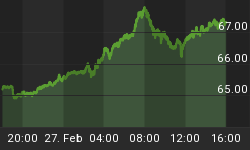Well, I guess it would be hard to have a clearer sign that investors are over their skis than to have the Fed drop the portion of their communique that was most-binding - in a move that was fully anticipated by almost everyone and telegraphed ahead of time by NY Fed President Dudley - and watch markets decline anyway.
To be sure, the stock market didn't exactly plunge, but bonds took a serious hit and TIPS were smacked even worse. TIPS were mainly under pressure because there is an auction scheduled for tomorrow and it was dangerous to set up prior to the Fed meeting, not because there was something secretly hawkish about the Fed's statement. Indeed, they took pains to say that "a highly accommodative stance of monetary policy remains appropriate," and apparently they desire for policy to remain highly accommodative for longer relative to the unemployment threshold than they had previously expressed.
The next Fed tightening (let us pretend for a moment that the taper is not a tightening - it obviously is, but let's pretend that we're only talking about overnight interest rates) was never tied to a calendar, and it would be ridiculous to do so. But it seems that maybe some investors had fallen in love with the idea that the Fed would keep rates at zero throughout 2015 regardless of how strong or how weak the economy was at that time, so that when the Fed's members projected that rates might reach 1% by the end of 2015 - be still, my heart! - these investors had a conniption.
Now, I fully expect the Fed to tighten too little, and too late. I also expect that economic growth will be sufficiently weak that we won't see interest rates rise in 2015 despite inflation readings that will be borderline problematic at that time. But that view is predicated on my view of the economy and my assessment of the FOMC members' spines, not on something they said. You should largely ignore any Fed communication unless it regards the very next meeting. They don't know any better than you do what the economy is going to be doing by then. If they did, they would only need one meeting a year rather than eight. Focus on what the economy is likely to be doing, and you'll probably be right more often than they are.
Arguably, this was not the right theory when the Fed was simply pinning rates far from the free-market level, but as the Fed's boot comes off the market's throat we can start acting like investors again rather than a blind, sycophantic robot army of CNBC-watching stock-buying machines.
Now, I said above that "the stock market didn't exactly plunge," and that is true. On the statement, it dropped a mere 0.3% or so. The market later set back as much as 1%, with bonds taking additional damage, when Chairman Yellen said that "considerable period" (as in "a considerable period between the end of QE and the first rate increase) might mean six months.
Does that tell you anything about the staying power of equity investors, that a nuance of six months rather than, say, nine or twelve months of low rates, causes the market to spill 1%? There are a lot of people in the market today who don't look to own companies, but rather look to rent them. And a short-term rental, at that, and even then only because they are renting them with money borrowed cheaply. For the market's exquisite rally to unravel, we don't need the Fed to actually raise rates; we need markets to begin to discount higher rates. And this, they seem to be doing. Watch carefully if 10-year TIPS rates get back above 0.80% - the December peak - and look for higher ground if those real yields exceed 1%. We're at 0.60% right now.
Stocks will probably bounce over the next few days as Fed speakers try and downplay the importance of the statement and of Yellen's press conference remarks (rhetorical question: how effective is a communication strategy if you have to re-explain what you were communicating)? If they do not bounce, that ought also to be taken as a bad sign. Of course, I continue to believe that there are many more paths leading to bad outcomes for equities (and bonds!) than there are paths leading to good outcomes. Meanwhile, commodity markets were roughly unchanged in aggregate today...
You can follow me @inflation_guy!
Enduring Investments is a registered investment adviser that specializes in solving inflation-related problems. Fill out the contact form at http://www.EnduringInvestments.com/contact and we will send you our latest Quarterly Inflation Outlook. And if you make sure to put your physical mailing address in the "comment" section of the contact form, we will also send you a copy of Michael Ashton's book "Maestro, My Ass!"















